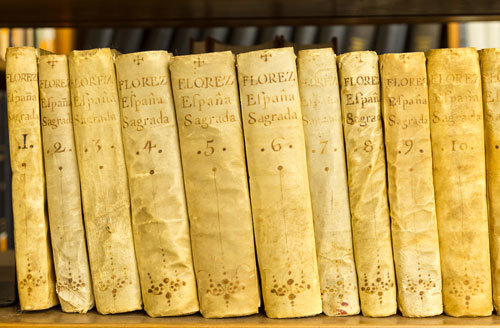Curriculum
 España Sagrada Collection in the Medieval Institute Main Reading Room
España Sagrada Collection in the Medieval Institute Main Reading Room
Have questions? Interested in majoring or minoring in Medieval Studies? Contact the MI's director of undergraduate studies, Christopher Liebtag Miller.
Overview
Medieval Studies offers three majors and one minor, draws from twelve disciplines, and is tailored to each student’s personal and professional goals. Students are encouraged to build a unique program of study, in consultation with a faculty advisor, around an area of concentration from that captures an interest, prepares for a field, or contributes to an academic pursuit.
A Medieval Studies seminar (3 credits) is also required. Students in the seminars are expected to read widely and discuss vigorously a set of sources which present a particular issue from several points of view. In addition they are also expected to write a substantial research paper. The goal of the seminar is to engage students in thinking critically and knowledgeably across the boundaries of traditional disciplines while maintaining a focus on a particular time, place, or issue.
Requirements
Medieval Studies Major (30 credits)
- MI 20001: The World of the Middle Ages
- Four courses drawn from two of more departments representing a concentration
- Four electives in Medieval Studies drawn from at least two departments
- One advanced seminar (4000-level or above) in Medieval Studies
Medieval Studies Honors Major (36 credits)
- Same requirements as Major in Medieval Studies (see above)
- EXCEPT one Intermediate Latin course and one Advanced Latin course are required in lieu of two Medieval electives
- PLUS an Honors Thesis for 6 credits
Medieval Studies Supplementary Major (24 credits)
- MI 20001: The World of the Middle Ages
- Four courses drawn from two or more departments representing a concentration
- Two electives in Medieval Studies
- One advanced seminar (4000-level or above) in Medieval Studies
Medieval Studies Interdisciplinary Minor (15 credits)
- MI 20001: The World of the Middle Ages
- Three electives in Medieval Studies
- One advanced seminar (4000-level or above) in Medieval Studies
Students have access to the resources of the collection and staff of the library that forms the core of the Medieval Institute. They are also encouraged to attend the Institute’s lectures and academic events. Undergraduates compete for the Robert M. Conway Prize, an annual award given for an outstanding paper written on a medieval topic, and both majors and minors in Medieval Studies participate in the Medieval Institute's unique all-Latin graduation ceremony.
Courses
Every semester the Medieval Institute originates courses and cross-lists courses originated by other departments. In each autumn and spring semester, approximately 25 courses that focus on medieval topics are open to undergraduate students. Some courses appear on the schedule on a yearly basis while others are offered irregularly.
The most up-to-date information on course offerings for the current and upcoming semesters is found through Class Search. Course numbers 10000 to 59999 are for undergraduates.
Recent course offerings
MI 20185 Arthurian Literature
MI 20703 Early Christian/Byzantine Art
MI 20772 Medieval and Renaissance Music History
MI 30241 Ancient Japan
MI 30255 The 12th-century Renaissance & Reform
MI 30530 Survey of French Literature I
MI 30663 Historical Survey: Arab Middle East
MI 35811 Archaeology of Ireland
MI 40181 Medieval Dreaming & Dream Texts
MI 40565 The Divine Comedy: The Christian Universe
MI 43343 Aquinas on Human Nature
Helpful Links
FAQs
Can I count a Medieval Studies course as part of my major/minor requirements AND as a University core requirement? Please review the A&L credit policies.
If I want to go to Graduate School after I get a B.A. in Medieval Studies, can I apply to a graduate program in a traditional field of study like English or History? A Medieval Studies undergraduate degree is excellent preparation for graduate study, whether in a Medieval Studies graduate program or in a standard departmental field. You may wish to strengthen your background with additional non-medieval course work in the department in which you will pursue graduate study. (For example, a Medieval Studies major who wants to go to graduate school in English might wish to take courses in literary theory or modern poetry.)
Do I have to be in the College of Arts and Letters to minor in Medieval Studies? No, you can minor in Medieval Studies regardless of your College or School affiliation.